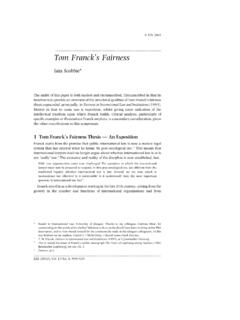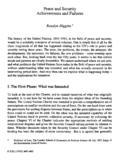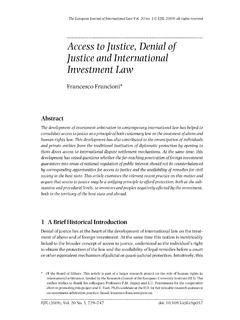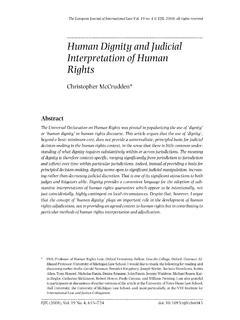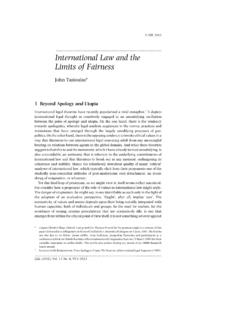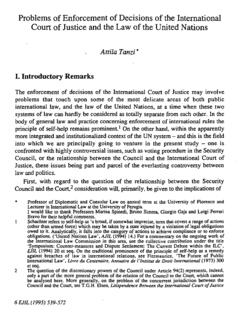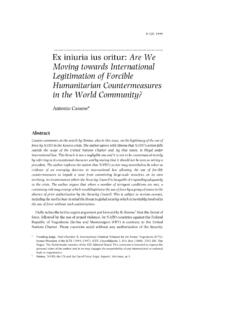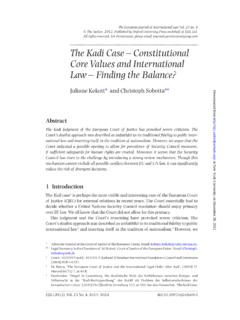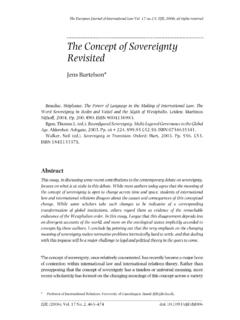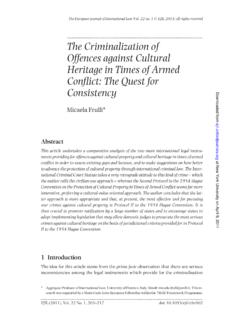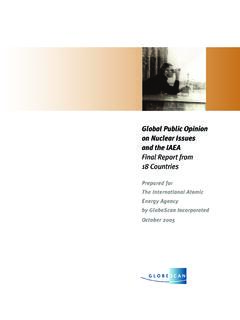Transcription of The ECJ's Opinion 1/94 on the WTO - No Surprise, but Wise?
1 The ECJ's Opinion 1/94 on the WTO. - No surprise , but wise ? - MeinhardHilf*. I. Joint Competences for the Conclusion of the WTO. It was hardly a surprise . On the european side the WTO could only be concluded as a mixed agreement. The european Court of Justice (ECJ) ruled on 15 November 1994: (1) The Community has sole competence, pursuant to Article 113 of the EC Treaty (ECT), to conclude the multilateral agreements on trade in goods. (2) The Community and its Member States are jointly competent to conclude GATS. (3) The Community and its Member States are jointly competent to conclude TRIPS. Indeed, States are sensitive when it comes to limitations of their foreign relations powers which are still considered to tbe the hard core of the ageing concept of national sovereignty.
2 If it has already been difficult for them to accept constitutional restraints, 1 it seems even more difficult for them to consent to being bound institutionally in relation to the process of european integration or international cooperation. Within the EC the Commission had requested the ECJ under the procedure of Article 228(6) ECT 2 to confirm the exclusive competence of the EC to conclude the WTO Agreement which had been negotiated within the framework of the Uruguay Round. The Advisory Opinion given by the Court has to be seen in the light of the present atmosphere within various Member States as to the future development of the european Union.
3 Moreover, the Court's own case-law has recently tended more towards understanding and protecting the legitimate interests of the EC Member * University of Hamburg. 1 See recently R. Hofmann, Grundrechte und grenziiberschreitende Sachverhalle (1994). 2 Art. 228(6) ECT: "The Council, the Commission or a Member State may obtain the Opinion of the Court of Justice as to whether an agreement envisaged is compatible with the provisions of this Treaty. Where the Opinion of the Court of Justice is adverse, the agreement may enter into force only in accordance with Article N of the Treaty on european Union'.
4 6 EJ1L (1995) 245-259. Meinhaid Hilf States. Therefore it was hard to believe that the Court would recognize the exclusive competence on the side of the EC to conclude all the agreements annexed to the WTO Agreement. It certainly was not an easy decision for the Court. On the one hand, the Court's case-law as to the scope and evolving dimension of the powers under the Common Commercial Policy (CCP) offered at least the possibility of covering all the agreements to be concluded under the WTO. Even the contracting parties outside the EC would have understood and probably accepted the EC becoming the sole contracting party under the WTO.
5 Were not the agreements under the WTO. considered to be a 'single undertaking'? Was not the extension of the GATT to the areas of services and TRIPS well justified if not necessary due to modern trends within the international economy? One internal market and one common commercial policy? Was not Article B(l) 2nd indent, of the Treaty on the european Union (ETU) aimed at the assertion of the 'international identity' of the EU? Did not the preamble of the TEU underline the reinforcement of the ' european identity'? 3. On the other hand, the Council and eight Member States stood against the Commission having requested the Advisory Opinion .
6 In their written observations with respect to this procedure some of the Member States have used rather strong language by qualifying the Commission's position as 'extravagant'.4 During the entire history of the GATT the Member States of the EC had always been contracting parties, in recent times alongside with the EC - at least with respect to some particular agreements. Should the mere fact that the GATT was being extended to the areas of services (GATS) and of intellectual property (TRIPS) mean that from now on the membership of the EC Member States should come to an end by formally recognizing the exclusive competence of the EC with regard to the conclusion of the WTO?
7 Thus the ECJ was set to arbitrate between the Commission and the EC Member States. In the following the Advisory Opinion 1/94 of 15 November 1994 will be analysed to investigate whether it convincingly supports the overall conclusion of the Court that GATS and TRIPS had to be concluded as a mixed agreement. Some attention will first be given to the origin of this dispute (II) and to the procedural set-up of this case (III). Then the Court's Opinion will be scrutinized as to its arguments in the light of the CCP as well as of possible implied powers and whether 3 Preamble TEU, 9th indent: 'Resolved to implement a common foreign and security policy including the eventual framing of a common defence policy, which might in time lead to a common defence, thereby reinforcing the european identity and its independence in order to promote peace, security and progress in Europe and in the world [.]
8 ]'; and Art. B, 2nd indent: "The Union shall set itself the following objectives: [..] - to assert its identity on the international scene, in particular through the implementation of a common foreign and security policy including the eventual framing of a common defence policy, which might in time lead to a common defence'. 4 Cf. 1-37 of the Court's Opinion (not yet published). 246. The ECJ's Opinion 1/94 on the WTO - No surprise , but wise ? - these justify the above-mentioned overall assessment of the competences of the EC. (IV). Some preliminary conclusions will be drawn stressing that it will be largely the Member States themselves which will have to take the responsibility of strengthening the position of the EC within the WTO (V).
9 II. An Avoidable Conflict? The history of the EC finally becoming a contracting party of the WTO is well known. It was a gradual process of 'substituting' its Member States according to the evolving CCP under Article HOss ECT. Strictly speaking, it was neither a substitution nor a succession of its Member States within the framework of GATT. as the EC did not formally become a contracting party under GATT. Whilst the Commission acted mainly as sole negotiator and spokesman on behalf of the Community and its Member States, the Member States continued to exercise their voting rights. Only some side-agreements under the Tokyo Round had been signed on behalf of the EC According to Article XI(1) of the WTO Agreement, the contracting parties to GATT 1947 and the EC shall become original Members of the WTO.
10 This text was agreed upon on the basis of negotiations under the Uruguay Round from 1986 up to 15 December 1993 when the Trade Negotiation Committee (TNC) approved the Final Act embodying the results of the Round. The Commission had been assigned the role of the sole negotiator on behalf of the Community and its Member States. But from the outset it was not clear whether all the issues under negotiation were part of the competences of the EC or of its Member Not surprisingly, at the very end of the negotiations the issue of competences was still unresolved. On 7 and 8 March 1994 both the Council and the Member States decided that the Final Act and the WTO Agreement would be signed on behalf of the EC and the Member States at Marrakesh on 15 April 1994.
